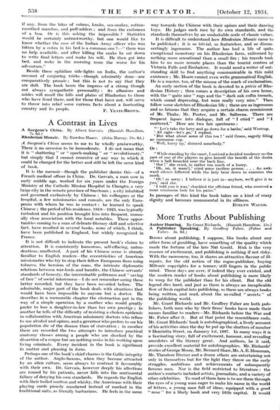A Contrast in Lives
Rhodesian Mosaic. By Rawdon Hoare. (John Murray. 10s. 6(1.) A Surgeon's China seems to me to be wholly praiseworthy. There is no occasion to be immoderate. I do not mean that it is " shattering " or " epoch-making " or *a revolutionary," but simply that I cannot conCeive of any way in which it could be changed for the better and still be left the same kind of book.
It is the memoir—though the publisher denies this—of a French medical officer in China. Dr. Gervais, a mail now in early middle age, worked for six years under the Foreign Ministry at the Catholic Mission Hospital in Chengtu, a very large city in the remote province of Szechuan ; a city inhabited and governed exclusively by Chinese ; his colleagues at the hospital, a few missionaries and consuls, are the only Euro- peans with whom he was in contact ; he learned to speak Chinese ; the period of his residence, 1919-1925, was typically turbulent and his position brought him into frequent, unusu- ally close association with the local notables. These oppor- tunities coming to a man of delicate-literary skill and selective fact, have resulted in several books, none of which, I think, have been published in England, but widely recognized in France.
It is not difficult to indicate the present .book's claims to attention. It is consistently humorous, self-effacing, unten- dentious, unaffected. A part of his Chinese scene is already familiar to English readers—the eccentricities of American missionaries who try to stop their fellow Europeans from using tobacco, the heroism of the nuns, the intricate diplomatic relations between war-lords and bandits, the Chinese servants' standards of honesty, the interminable politeness and " saving of face" of social intercourse—I do not remember seeing these better recorded, but they have been recorded before. The admirable, major part of the book deals with situations that would have been impossible to anyone but a doctor. He describes in a memorable chapter the obstruction put in the way of a simple operation by a .mother who would greatly prefer to' lose a daughter-in-law than her own prestige ; in another he tells of the difficulty of resisting a cholera epidemic in collaboration with. American missionary doctors who refuse to use alcohol and opium, and a governor who prefers to see his population die of the disease than of starvation ; in another there are recorded the two attempts to introduce practical anatomy classes among a people who are shocked by the dissection of a corpse but see nothing amiss in his working upon living criminals. Every incident in the book is significant in matter and pleasing in form.
Perhaps one of the book's chief charms is the Gallic integrity of the author. Anglo-Saxons, when they become attracted by an alien culture, seem always to contrast it favourably with their own. Dr. Gervais, however deeply his affections are roused by his patients,. never falls into the sentimental fallacy of denying his own standards. He regards the English with their boiled mutton and whisky, the Americans with their playing cards piously numbered instead of marked in the traditional suits, as literally barbarians. He feels in the same way towards the Chinese with their opium and their dancing boys. He judges each race by its own standards, and the standards themselves by an unshakable scale of classic values.
It is difficult to understand how Rhodesian Mosaic came to be published ; it is so trivial, so featureless, and so discon- certingly ingenuous. The author has had a life of quite exceptional monotony on his Rhodesian farm, enlivened by nothing more sensational than a small fire ; his travels took him to no more remote places than the tourist centres of Victoria Falls and Zimbabwe. It would need a writer of out- standing skill to find anything communicable in this mild existence ; Mr. Hoare cannot even write grammatical English. He is a master, too, of the misuse of the mark of exclamation.
An early section of the book is devoted to a precis of Rho- desian History ; then comes a description of his own -home, with the "quite nice" rugs and the "dark oak coffin tressels, which sound depressing, but were really very nice." Then follow some sketches of Rhodesian life ; these are so ingenuous and so fatuous that they acquire a certain charm reminiscent of Mr. Thake, Mr. Pooter, and Mr. Salteena. There are frequent lapses into dialogue, full of "I cried" and "I muttered." Here are two fair specimens : " ' Let's take the lorry and go down for a bathe,' said Westrup. 'All right—let's go, I replied.
'But what about some of this tea ? ' said Green, eagerly filling an enormous cup.
'Well, hurry up,' shouted somebody."
Or:
"While standing by the court, I noticed a decided tendency on the part of one of the players to give herself the benefit of the doubt when a ball bounded near the back line.
Out ! ' she cried, in rather too much of a hurry. Oh, no, it wasn't,' cried some tactless person. . . An awk- ward silence followed while the lady bent down to examine the mark.
Oh ! so sorry ; I believe it is just in—anyhow, we'll give it to you,' said she.
I told you it was,' chuckled the officious friend, who received a most venomous look for his pains."
In passages of this kind the book takes on a kind of crazy dignity and becomes monumental in its silliness.
EVELYN WAUGH.














































 Previous page
Previous page